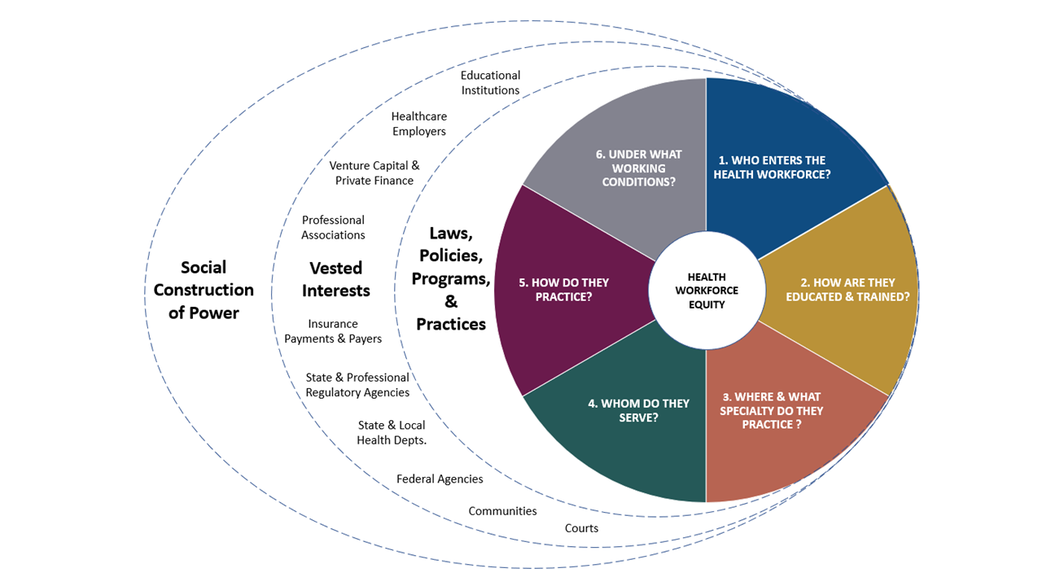You are here: Home >> About the Institute
Our Vision
Our vision is a diverse health workforce that has the competencies, opportunity, and courage to ensure that all people attain their full health potential. We call this Health Workforce Equity (HWE).
Health equity is a growing field of research. The Fitzhugh Mullan Institute for Health Workforce Equity (Mullan Institute) contributes to this work by focusing specifically on how the health workforce can address health equity. Our vision is a diverse health workforce that has the competencies, opportunity, and courage to ensure that all people attain their full health potential. We call this Health Workforce Equity (HWE).
The people who deliver health services and health promotion constitute one of the primary mechanisms to both advance health equity, and to further entrench health inequities. The composition, training, distribution, willingness to serve the most disadvantaged groups in society, the ways they practice, and the working conditions of the entire health workforce (home care workers, support staff, allied clinicians, public health, doctors, and nurses) are critically important factors determining whether, and what kind of care is provided to the most disadvantaged sectors of our society. HWE is largely determined by a complex ecosystem of policies, programs, and practices driven by stakeholder interests and social values. From educational funding streams at the state and federal level, to regulatory oversight of professions, to health care payment policies and organizational rules driving practice environments, many stakeholders are determining the “who, where, to whom, how, and under what conditions” health workers deliver services.
An important step in holding these stakeholders accountable for their effect on the health workforce is to measure performance in the following areas:
To provide a foundational underpinning for this work, the Mullan Institute developed a HWE Framework to examine these six domains (Pittman et. al, 2022), as shown below. In May 2022, we published the Health Workforce Equity Evidence Review Series, which introduces readers to the six domains of HWE, synthesizes the research on how it relates to health equity, and discusses the main policies and programs that impact the domain.
The people who deliver health services and health promotion constitute one of the primary mechanisms to both advance health equity, and to further entrench health inequities. The composition, training, distribution, willingness to serve the most disadvantaged groups in society, the ways they practice, and the working conditions of the entire health workforce (home care workers, support staff, allied clinicians, public health, doctors, and nurses) are critically important factors determining whether, and what kind of care is provided to the most disadvantaged sectors of our society. HWE is largely determined by a complex ecosystem of policies, programs, and practices driven by stakeholder interests and social values. From educational funding streams at the state and federal level, to regulatory oversight of professions, to health care payment policies and organizational rules driving practice environments, many stakeholders are determining the “who, where, to whom, how, and under what conditions” health workers deliver services.
An important step in holding these stakeholders accountable for their effect on the health workforce is to measure performance in the following areas:
- Do the people entering the health workforce in different professions reflect the diversity of our populations?
- To what extent are they educated and trained with social mission goals?
- Are they distributed according to population need?
- Who, by geography and by profession, is actually providing care to high-needs patients?
- Are they practicing in ways that help address the root causes of health disparities?
- Are they working in safe and fair conditions?
To provide a foundational underpinning for this work, the Mullan Institute developed a HWE Framework to examine these six domains (Pittman et. al, 2022), as shown below. In May 2022, we published the Health Workforce Equity Evidence Review Series, which introduces readers to the six domains of HWE, synthesizes the research on how it relates to health equity, and discusses the main policies and programs that impact the domain.
|
Located in the Department of Health Policy at the George Washington University in Washington, D.C., the Mullan Institute not only draws upon the resources from the National Capital Area, but also GW's diverse and distinguished faculty. The Mullan Institute consists of a group of faculty and staff from seven schools across the GW and represents an array of disciplines, including economics; anthropology; health services research; and education; as well as the professional perspectives of medicine; nursing; physician assistants; and pharmacists. This is consistent with GW’s goal of building on its unique location, expertise in governance and policy orientation, and its commitment to cross disciplinary scholarship.
|

